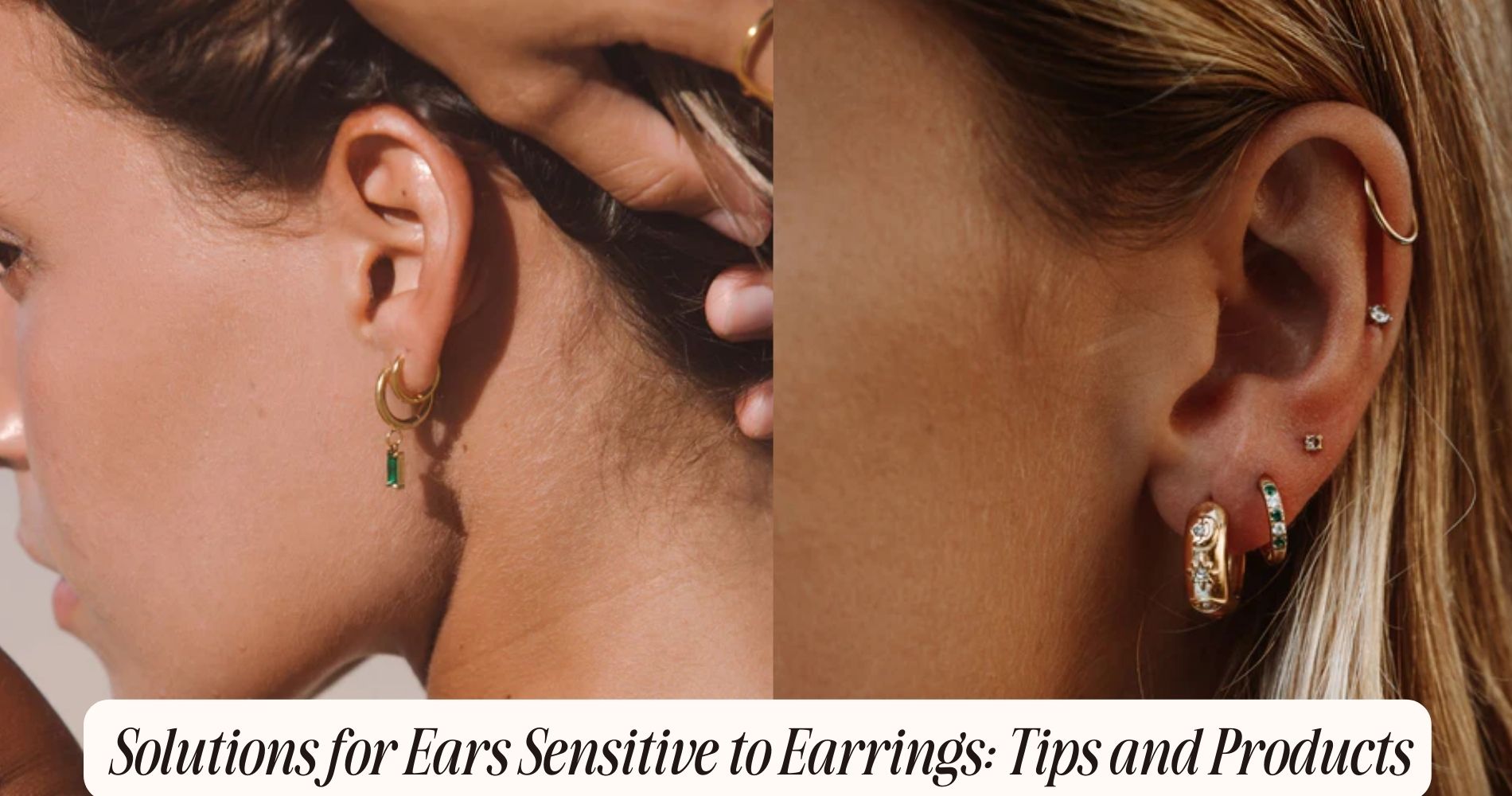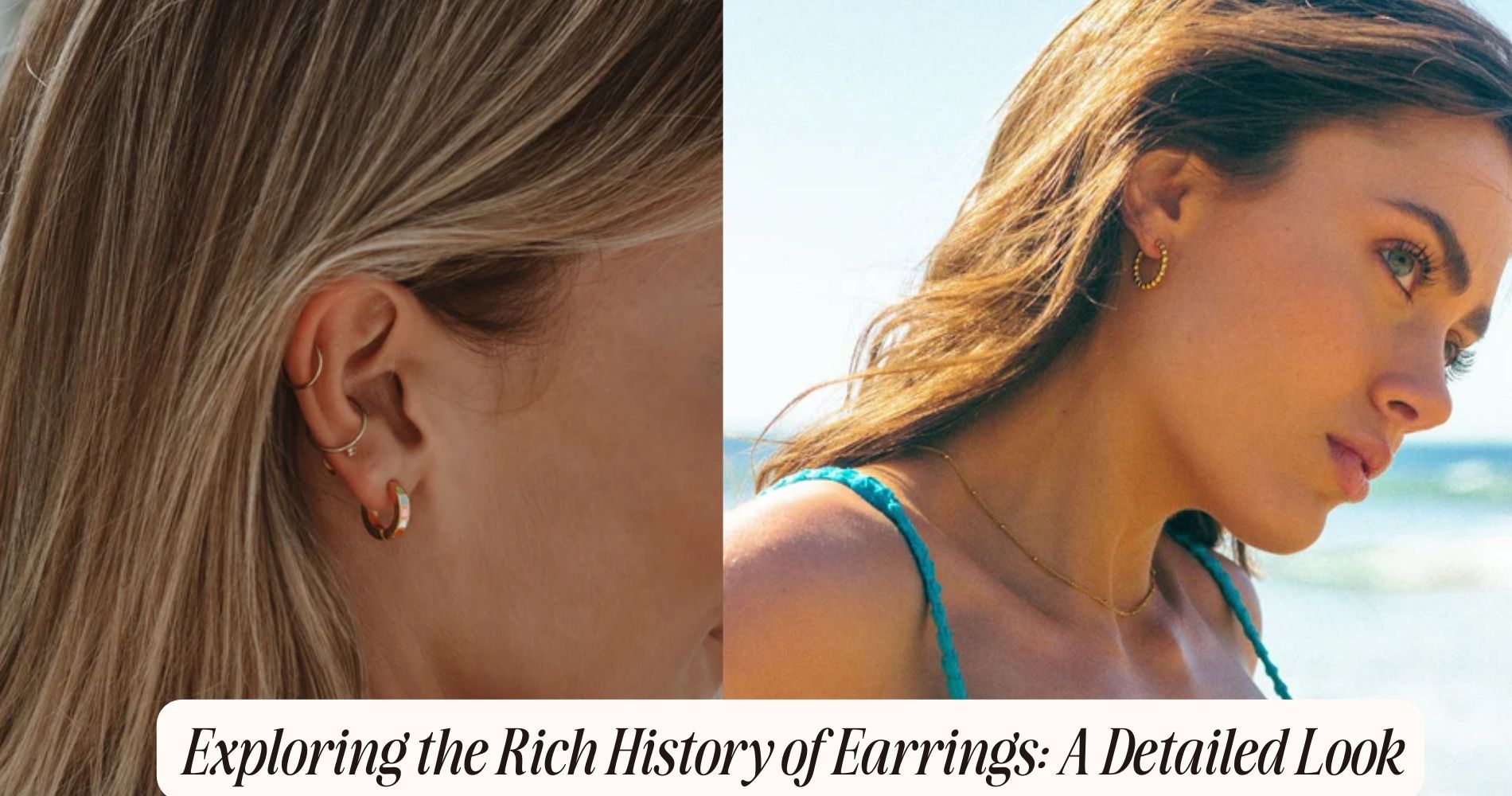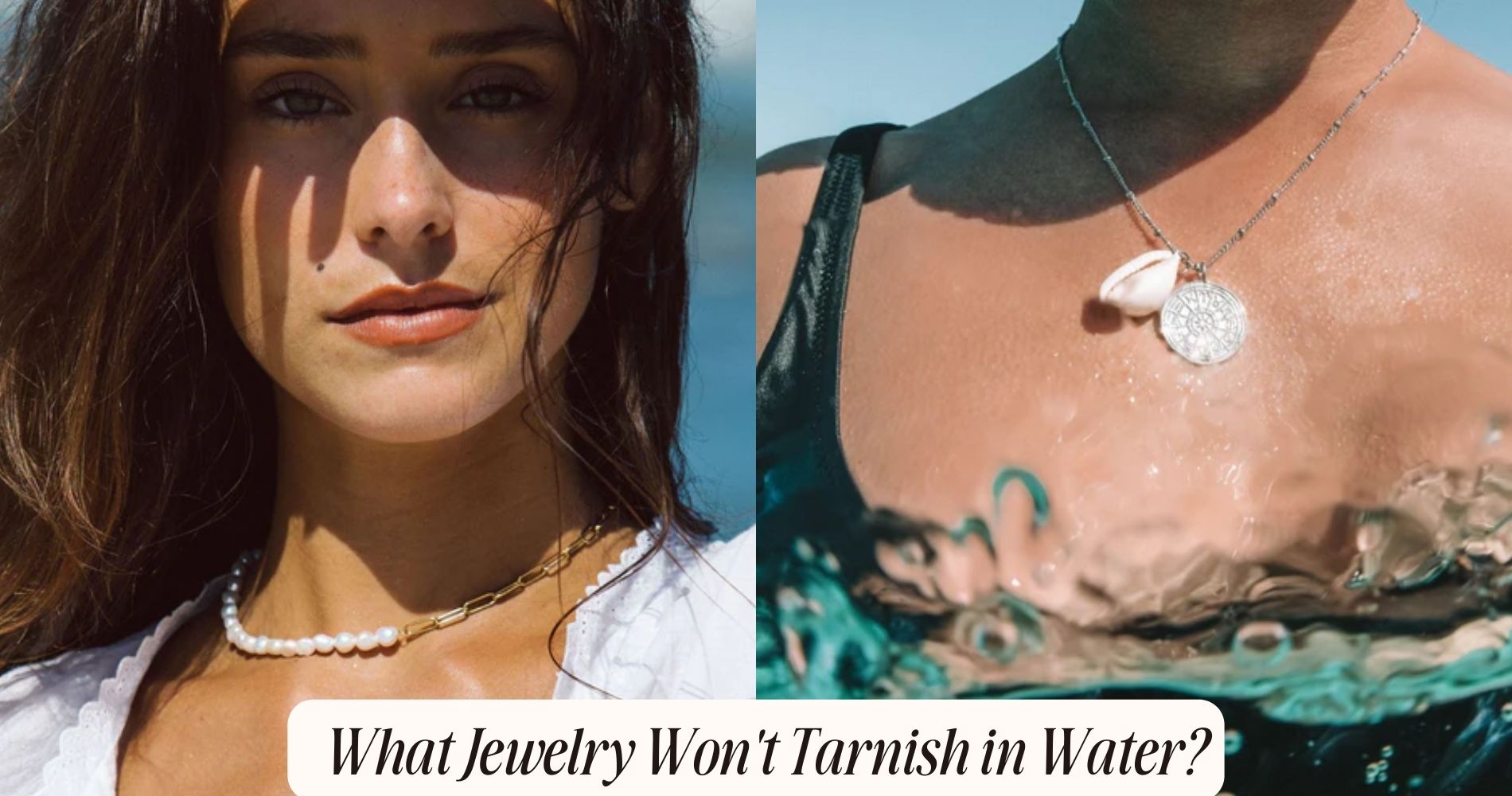
Solutions for Ears Sensitive to Earrings: Tips and Products
If your ears are sensitive to earrings, there are helpful tips and products to ease your discomfort. Identifying triggers like nickel can prevent irritation. Opt for hypoallergenic metals such as titanium, 14k gold, or non-metal options like plastic. Regularly clean your earrings to manage reactions. Titanium and surgical stainless steel are durable, skin-friendly choices. Consider silicone earring backs for a secure fit. Testing earring patches and guards can reduce friction. For tailored advice, consult a dermatologist or allergist. For practical solutions that ensure comfort and style, explore our Hypoallergenic Jewelry collection, specifically designed to make wearing earrings a breeze for those with sensitive skin.
Understanding Earring Sensitivities
If your ears often react negatively to certain earrings, it's important to understand why this sensitivity occurs. Earring sensitivity triggers can include allergens like nickel, cobalt, and other metals present in the earrings. These metals can cause irritation and allergic reactions in sensitive ears. To prevent such reactions, opt for earrings made from hypoallergenic materials like surgical stainless steel, titanium, or nickel-free metals. Regularly cleaning your earrings and earlobes can also help prevent sensitivity issues.
When it comes to sensitive ears care, there are a few tips to keep in mind. Avoid wearing earrings for extended periods, especially if they cause discomfort. It's also important to choose earrings with smooth, rounded edges to reduce friction and irritation on the skin. Additionally, consider applying a thin layer of hypoallergenic clear nail polish on the earring posts to create a barrier between the metal and your skin. Taking these precautions can help minimize earring sensitivity and keep your ears happy and healthy.
Choosing Hypoallergenic Metals
When selecting earrings for sensitive ears, opt for hypoallergenic metals to minimize the risk of irritation. Safe metal options like titanium, surgical stainless steel, and 14k or higher gold can be gentle on sensitive skin.
Choosing nickel-free earrings is essential to prevent allergic reactions, ensuring a comfortable and stylish experience.
Safe Metal Options
When selecting earrings for sensitive ears, opt for hypoallergenic metals known to cause the least amount of irritation, such as titanium, sterling silver, and 14k gold.
Titanium is an excellent choice as it's biocompatible, making it suitable for those with metal sensitivities.
Sterling silver, composed of 92.5% silver and 7.5% other metals like copper, offers a beautiful look while being gentle on sensitive ears.
14k gold, particularly yellow or rose gold, is a safe option for most individuals with sensitive skin.
If you're looking for alternative metals, consider gold-filled earrings, which have a thicker layer of gold bonded to a base metal, or explore copper options, as pure copper is generally well-tolerated by many.
Nickel-Free Choices
For those with sensitive ears, choosing nickel-free earrings is crucial to prevent skin irritation and allergic reactions. Consider alternative materials like surgical stainless steel, titanium, or 14k gold to guarantee comfort and avoid potential reactions. These metals are hypoallergenic and less likely to cause irritation, providing a suitable option for individuals with sensitive ears.
Non-metal options such as plastic, wood, or silicone offer flexibility in styles while eliminating the risk of nickel exposure. When selecting earrings, prioritize nickel-free options to maintain ear health and minimize discomfort. By opting for hypoallergenic metals and non-metal alternatives, you can enjoy wearing earrings without worrying about adverse reactions, ensuring a pleasant and irritation-free experience.
Allergic Reaction Prevention
To prevent allergic reactions, selecting hypoallergenic metals for your earrings is essential for maintaining ear health and ensuring comfort. Hypoallergenic metals such as surgical stainless steel, titanium, and niobium are great choices for individuals prone to earring sensitivity. These metals are less likely to cause skin irritation and allergic reactions, making them ideal for those with sensitive ears.
When shopping for earrings, look for pieces labeled as hypoallergenic to reduce the risk of allergic reactions. Additionally, regularly cleaning your earrings with a gentle solution and avoiding wearing earrings for prolonged periods can also help in managing allergic reactions.
Opting for Nickel-Free Options
If you experience symptoms like redness or itching when wearing earrings, you may have a nickel allergy. Opting for nickel-free earring options can help alleviate these discomforts.
Look for earrings made from hypoallergenic materials like surgical stainless steel, titanium, or sterling silver for skin-friendly alternatives.
Nickel Allergy Symptoms
Sensitivity to nickel in earrings can manifest through various symptoms, prompting individuals to seek out nickel-free options for their jewelry. Nickel allergy symptoms can include redness, itching, swelling, dry patches, and blistering on the earlobes or around the pierced area.
Allergic reactions to nickel in earrings are commonly characterized by skin irritation that may worsen with prolonged exposure. If you experience these symptoms, consider switching to nickel-free earrings to alleviate discomfort and prevent further reactions.
Opt for earrings made from materials such as surgical stainless steel, titanium, or hypoallergenic metals like sterling silver or gold. Choosing nickel-free options can help reduce the risk of developing allergic reactions and maintain healthy ear piercings.
Hypoallergenic Earring Materials
Considering your sensitivity to nickel in earrings, exploring hypoallergenic earring materials like surgical stainless steel, titanium, or sterling silver can help guarantee any discomfort and prevent allergic reactions.
Allergic reactions to nickel can cause redness, itching, swelling, or even blistering on the earlobes. By opting for nickel-free options such as surgical stainless steel, titanium, or sterling silver, you can reduce the risk of experiencing these unpleasant symptoms. These materials are known for being gentle on sensitive skin and are less likely to trigger allergic reactions.
When choosing earrings, look for labels specifying hypoallergenic or nickel-free to make sure they're safe for your ears. These sensitivity solutions can make a significant difference in your earring-wearing experience.
Skin-Friendly Earring Options
Looking for skin-friendly earring options that are nickel-free? Opting for nickel-free earrings can be a game-changer in managing allergies and sensitivities.
When choosing earrings, look for materials such as titanium, surgical stainless steel, or 14k gold, as these are less likely to cause skin reactions. Earring styles like studs, hoops, and huggies are popular choices available in nickel-free options, allowing you to enjoy a variety of designs without compromising on comfort.
Trying Earrings With PTFE Posts
Consider exploring earrings with PTFE posts for a hypoallergenic and comfortable alternative to traditional earring materials. Earring sensitivity can be a common issue for many individuals, often due to reactions to certain metals like nickel. PTFE, also known as polytetrafluoroethylene, is a synthetic material that's biocompatible and widely used in medical implants, making it an excellent choice for those with sensitive ears.
PTFE posts are gentle on the skin, reducing the risk of irritation or allergic reactions that can occur with other post materials. Additionally, PTFE is lightweight and flexible, providing a comfortable wearing experience throughout the day. Its non-stick surface also helps prevent buildup of bacteria and dirt, promoting better ear health.
When selecting earrings with PTFE posts, make sure that the decorative part of the earring is also made from hypoallergenic materials to minimize the risk of any potential reactions. By opting for earrings with PTFE posts, you can enjoy stylish accessories without compromising on comfort or causing irritation to your ears.
Testing Earring Patches and Guards
For those seeking additional protection and comfort when wearing earrings, exploring the effectiveness of earring patches and guards can be beneficial. Earring patches are adhesive discs that can be applied to the earring back to create a barrier between the metal and the skin. Conducting patch testing to determine if these patches cause any skin irritation is important. Some users may find that certain materials in the patches can still cause reactions, so patch testing results should be carefully monitored.
On the other hand, earring guards are plastic or silicone sleeves that slide onto the earring post. They can provide a cushion between the earring and the skin, reducing friction and potential irritation. Guard effectiveness varies depending on the material used and individual sensitivities. Testing out different types of guards can help identify which ones work best for you. It's crucial to pay attention to any changes in skin reaction or discomfort when using these guards and adjust based on the guard effectiveness and your comfort level.
Seeking Professional Help
Should you find that your attempts to alleviate earring sensitivity issues aren't yielding the desired results, consulting with a professional in the field of dermatology or allergology can provide valuable insights and personalized recommendations for managing your condition effectively. Ear sensitivity management requires a thorough assessment by a specialist who can determine the underlying cause of your sensitivity to earrings. Professional advice on allergies related to metals commonly found in earrings, such as nickel, can help you identify specific allergens to avoid in the future.
A dermatologist or allergist can conduct allergy testing to pinpoint the exact triggers causing your ear sensitivity, enabling them to recommend suitable hypoallergenic earring materials or alternative solutions. Additionally, they can offer tailored treatment plans, which may include topical creams, oral medications, or other interventions to alleviate symptoms and prevent future reactions. Seeking professional help is essential for individuals struggling with persistent earring sensitivity, as it ensures a targeted approach to managing this discomfort and finding long-term relief.
Frequently Asked Questions
Can Stress and Anxiety Contribute to Earring Sensitivity?
Stress and anxiety can contribute to earring sensitivity. Managing stress and finding relief for anxiety may help alleviate the sensitivity. Prioritize stress management techniques and anxiety relief to potentially improve your ear sensitivity to earrings.
Are There Any Natural Remedies to Alleviate Earring Sensitivity?
To alleviate earring sensitivity, consider herbal remedies like chamomile or lavender oils. Homeopathic treatments such as arnica can also help. Holistic solutions like applying diluted tea tree oil may soothe your ears naturally and reduce irritation.
Can Wearing Earrings Too Tightly Cause Sensitivity Issues?
Wearing earrings too tightly can lead to sensitivity issues like piercing infection or irritation. It can exacerbate allergic reactions and cause redness. Make sure your earrings fit comfortably to prevent these problems and keep your earlobes healthy.
Is It Possible to Develop an Allergy to Hypoallergenic Metals Over Time?
Yes, it's possible to develop a metal sensitivity over time, even to hypoallergenic metals. Allergic reactions can manifest due to prolonged exposure. Consider switching to alternative materials like titanium or niobium if you experience discomfort with hypoallergenic options.
Are There Any Specific Earring Styles That Are Less Likely to Cause Sensitivity Reactions?
For sensitive ears, consider stud earrings or nickel-free options to minimize reactions. Hoop earrings with plastic backs can help. Experiment with different styles to find what works best for you. Prioritize comfort and materials that suit you.
Conclusion
To sum up, when addressing sensitive ears that react to earrings, there are various solutions to explore.
From opting for hypoallergenic metals like titanium or surgical stainless steel, to using silicone earring backs or PTFE posts, there are options available to help alleviate any discomfort.
Additionally, experimenting with earring patches and guards or seeking professional help can also provide relief for those with sensitive ears.
Don't let earring sensitivities hold you back from accessorizing - find the right solution for you.
























Leave a comment
This site is protected by hCaptcha and the hCaptcha Privacy Policy and Terms of Service apply.